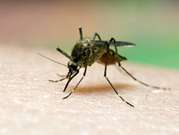New treatment for malaria tertiana

“Malaria tertiana is the form of malaria that science needs to focus on in more detail in future.” These are the words of Harald Noedl from the Institute of Specific Prophylaxis and Tropical Medicine at the Medical University of Vienna, spoken as part of World Malaria Day on Wednesday, 25th April. In a multi-centre study, the MedUni Vienna team, led by Harald Noedl, is working on an improved and more straightforward treatment of this form of malaria.
Although malaria tropica, which currently kills around 655,000 people a year (around 2,000 people every day), has increasingly been repressed as a result of more research, malaria tertiana may well develop into the main problem of the future in many countries, says Noedl. The problem does not so much involve the (low) mortality rate from malaria tertiana, but rather the often protracted period of illness that can occur as a result of the condition. This is because if the malaria tertiana pathogens are not killed with targeted therapy, they can remain dormant in the human liver for months or even years, and cause recurrent relapses.
Conventional therapy involves administering chloroquine for three days, followed by two weeks of primaquine therapy. “However unlike in Europe, compliance with medications in tropical countries is often very poor," explains the malaria expert from the MedUni Vienna. Many patients would discontinue the medication after just a few days.
As a consequence, the pathogens will survive in the liver and can cause an outbreak of malaria tertiana at any time which is as infectious as the other two forms of malaria. This makes patients a constant source of infection for their environment and the new condition is often no longer associated with the previous episode of malaria and therefore treated incorrectly. Says Noedl: “This makes patients, most of whom are the poorest of the poor, constantly ill, preventing them from working. It’s a fatal vicious circle.”
In a multi-centre study involving the MedUni Vienna, scientists are well on their way to establishing a new substance (tafenoquine). The advantage of this is that the drug only has to be taken for a maximum of three days. Tafenoquine is currently undergoing clinical trials.
MedUni Vienna and new malaria focus in Africa
Since 2006, the Center for Geographic Medicine at the MedUni Vienna's MARIB research center, led by Harald Noedl, has been working on malaria research in Bangladesh. More than 20,000 patients have been treated free of charge since. In 2012, the MedUni expanded its malaria focus to include Africa, and in particular Ethiopia. There, the MedUni team is cooperating with the University of Gondar in the north west of the country. Says Noedl: “We are keen to further the MedUni Vienna’s position as a leading centre for malaria expertise, lead multi-center studies and establish a global malaria network."













